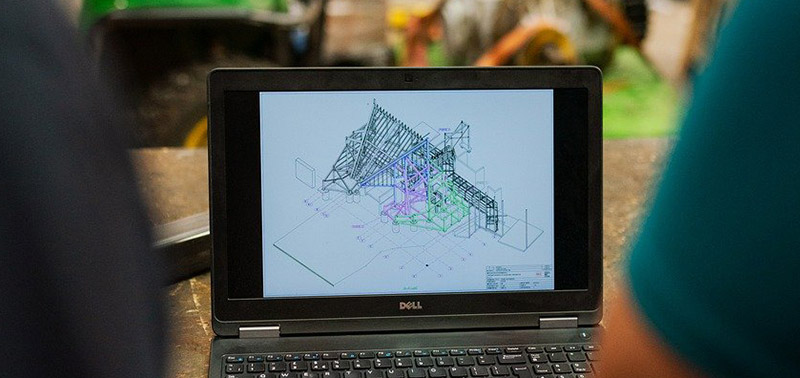
Major of Civil
New Cairo
Discover Civil Major
- About Major
- Program Objectives
- What will I learn?
- Career Path
- Mission
- Vision

About Major
The civil major at CIC provides a various number of courses in different civil disciplines, that teach students to highlight and solve problems, and improve the built environment, consequently, preparing them for the professional field.

Program Objectives
- To set solid foundations for mastering Civil Engineering principles through deep understanding of basic sciences and mathematics.
- To deliver an up-to-date academic curriculum in accordance with international standards in the field of Civil Engineering.
- Developing and enabling the students to promote their problem solving, critical thinking, creative thinking, self-learning, and decision-making skills.
- Providing an educational environment that enables students to achieve their goals in a program that supports their ability to understand, innovate, and perform scientific research through group work using modern technology to conduct experiments, analysis, and simulation, then evaluate and draw conclusions.
- Develop the competencies (acquired skills) of students for successful entrance in the Civil Engineering profession as practicing engineers, consultants with prominent companies and institutions in various fields. This includes; structural engineering, transportation, geotechnical, materials, environment, water resources engineering, and construction management with emerging areas including sustainability and risk assessment.
- Prepare an engineer who can compete on both local and international scales and has the professional competencies (acquired skills) necessary to meet the needs of the labor market.
- Serving the community and the Civil Engineering profession by engaging in public and service organizations.
- Educate the new generation of Civil Engineers with the skills, knowledge, and attitudes required to practice Civil Engineering and solve the problems facing an ever-changing society on both national and international scales.
- Use the techniques, skills, and appropriate engineering tools, necessary for engineering practice and project management.
- Supply the work market with graduates who can; participate with valuable and various Civil Engineering services, right after graduation.

What will I learn?
The Civil Engineering major offered by the Institute of Engineering at CIC aims to develop the academic and professional capabilities of the students and train them to be able to work in all areas of civil engineering. This field of study is considered the oldest professions in history. It includes a wide range of disciplines: (1) Structural engineering and construction management , (2) Public works engineering and (3) Hydraulic and water resources engineering. Graduation requirements: civil engineering students need to achieve 170 CHS to earn a Bachelor in civil engineering.

Career Path
Here is a glimpse of what students will study upon choosing Civil Engineering, hence defines the job description per discipline:
-Structural Engineering discipline aims to build safe structures with high quality and low costs. The discipline job opportunities include design and execution of buildings and other civil facilities such as bridges, dams, tunnels and facilities of special nature: such as tall buildings. Construction Management oversees various elements of the building process, hence helps in management of a project's resources and equipment, followed by knowing how to construct buildings that are safe, functional and sustainable. The Construction management sub-discipline opens doors to the following career paths: site engineering, construction manager, construction project manager, general contractor, construction project director, and sustainability consultant.
-Public-works discipline is intended to provide infrastructure work related to civil engineering with environmental goals and environmental protection systems. It teaches space geodesy and Photogrammetry, land information systems and remote sensing. Transportation planning, traffic engineering of railways and Highways, traffic engineering in airports, health and environmental engineering. The discipline job opportunities include environmental impact engineer, surveying and geodesy engineer, traffic engineer, GIS and remote sensing engineer.
-Water Resources Engineering and Hydraulics discipline aims to study the water behavior in open channels, drainage systems, design of networks (water, irrigation, sewage, and rain water drainage) and pump stations, groundwater flow and all other water resources applications. This discipline opens doors to work opportunities such as: networks simulation engineer, planning and land division, Water resources engineer, asset management planning engineer, environmental engineer, groundwater simulation engineer, water structures modelling engineer, and flash flood structures engineer.

Mission
“The program of Civil Engineering in the Higher Canadian Institute for Engineering and Business Technology is committed to preparing a distinguished graduate, by providing an educational program consistent with the National Academic Reference Standards to ensure the acquisition of civil engineering competencies and ethics through educational techniques, and the ability to conduct research to meet the requirements of our profession, societal needs, and develop entrepreneurship skills. The program instills in its graduates how to deal with academic/professional challenges using a creative manner in an ethical and moral domain.”

Vision
“The Civil Engineering Program at the Higher Canadian Institute for Engineering and Business Technology seeks leadership and excellence in the field of specialization on local and regional levels while achieving sustainable development.”
Major of Civil
Study Plan
The Civil Engineering program study plan aims to develop the academic and professional efficiency of students and train them for work in all Civil Engineering fields.
Foundation year
Semester 1
(BAS 011) Mathematics 1
(BAS 021) Physics1
(BAS 041) Engineering Chemistry
(MED 011) Engineering Drawing & Projection
(HUM 081) Computer Skills
(BAS 032) Mechanics 1
(HUMA1) General Requirements (Elective A)
Communication in Education
Semester 2
- (BAS012)Mathematics2
- (BAS 022)Physics 2
- (BAS 033)Mechanics 2
- (HUM 011)Arabic Language
- (MED 021)History of Engineering & Technology
- (MED 022)Principles of Manufacturing Engineering
- (HUM A2)General Requirements (Elective A2) Communication in Education II
Year 1
Semester 1
- (CIS 112)Structural Analysis 1
- (CIS 151)Geology
- (CIS 141)Behavior of Materials
- (CIW 231)Environmental Engineering
- (BAS 111)Mathematics 3
- (CIW 110)Fluid Mechanics
- (HUM 012)English Language 1
Semester 2
- (CIS 211)Structural Analysis 2
- (CIS 113)Solid Mechanics
- (CIW 121)Engineering Surveying 1
- (CIW 111)Civil Drawing
- (BAS 211)Mathematics 4
- (HUM 013)English Language 2
- (HUM 013)English Language 2
Year 2
Semester 1
- (CIS 251)Soil Mechanics
- (BAS 212)Statistics & Probability Theory
- (CIS 221)Design of Concrete Structures 1
- (CIW 113)Hydrology
- (CIS 241)Concrete Technology
- (HUM B1)General Requirements (Elective B)
- (HUMA3)General Requirements (Elective A)
Semester 2
- (CIS 231)Desi n of steel structure 1
- (CIW 112)Hydraulics
- (ARC 133)Introduction to Building Construction
- (CIS 321)Design of Concrete Structures 2
- (CIW 331)Environmental Impacts of Projects
- (HUM 111)Technical report writing
- (INST A1)Institute Requirements Elective A
Placement year
Semester 1
- (291)Field Training 1
- (CIS 351)Foundations Engineering 1
- (CIVILA1)Minor.Requirements ( Elective A)
Desi n of Concrete Structure 3 - (CIW 211)Irrigation Network Engineering
- (CIS 331)Design of steel structure 2
- (CIS 311)Structural Analysis 3
- (lEN 314)Project Management
Semester 2
- (CIS 361) Construction Management
(CIVIL -A3) Minor.Requirements - ( Elective A)
Sanit~1}' Engineering - (HUM 181) Communication & Presentation Skills
- (CIW 341) Highway Engineering
- (lEN 131) Monitoring & Quality Control System
- (HUM351)Professional Ethics
Final year
Semester 1
- (INST A2) Institute Requirements Elective A
(INST A3 )Institute Requirements Elective A
(391) Field Training 2
(CIVIL -A4) Minor.Requirements ( Elective A)
(HUM 182) Analysis & Research Skills
( CIVIL -A5) Minor.Requirements ( Elective A)
( HUM 381) Principles of Negotiation 2 1
(ARC 135) Building Construction
Semester 2
- (CIVIL -B1)Minor. Requirements ( Elective B )
- (CIVIL -A6)Minor .Requirements ( Elective A)
- ( lEN 351)Engineering Economics
- (CIVIL -A7) Minor. Requirements ( Elective A )
Engineering Surveying 2 - (HUM 352) Human Rights
- ( HUM A4) General Requirements (Elective A)
Programme specification
Institute Requirements ( ElectiveB) (Select 6 Credit Hrs.)
- (CIS 111)Principles of Construction & Building Engineering
- (ARC 111)Arts & Architecture
- (ELP 111)Principles of Electrical Engineering
- (ELE 121)Principles of Electronic Engineering
- (MED 111)Principles of Design & Manufacturing Engineering
- (MEP 111)Principles of Mechanical Power Engineering
- (ARC 110)Principles of Architectural Design
- (ELE 477)Principles of Coding Theory
- (ELE 472)Principles of Optoelectronics
Minor.Requirements ( Elective A)(Select21 credit HRS)
CIS 411 Structural Dynamics
CIS 322 Design of Wall Bearing Structures
CIS 421 Design of Concrete Structure 3
CIS 431 Design of Bridges
CIS 432 High Rise Buildings
CIS 341 Repair & Strengthening of Structure
CIW221 Engineering Surveying 2
CIS 451 Foundations Engineering 2
CIS 461 Construction Engineering
CIW 311 Design of Irrigation Structures
CIW 332 Sanitary Engineering
CIW 441 Transportation Engineering
CIW 451 Harbor Engineering
Minor.Requirements ( Elective B)(Select6 credit HRS)
- (CIS491)Project
- (CIW)Project
Minor.Requirements ( Elective A)(Select8 credit HRS)
- (HUM X62)Music Appreciation
- (HUM X71)Introduction to History of Civilization
- (HUM X72)Trends in Contemporary Arts
- (HUM X73)Recent Egypt's History
- (HUM X74)Heritage of Egyptian Literature
- (HUM X75)Arab & Islamic Civilization
- (HUM X76)Literary Appreciation
- (HUM X51)Communication in Education I
- (HUM X52) Communication in Education 2
Major Requirements (Elective B) Select 2 Credit Hrs.
- (AHUM 121)Introduction to Accounting
- (HUM 221)Business Administration
Our Staff

Dr. Mervat Refaat
Head of Civil Department at Engineering School
• PhD Philosophy in Surveying Engineering, Zagazig University, 2004..
• Masters in Surveying Engineering, Zagazig University, 1997.
• B.Sc. of Civil Engineering, Benha University, 1989.

Dr. Noran Mohamed
Assistant professor at Engineering School
• PhD in Civil Engineering, Ain Shams University, 2020.
• Master’s in Civil Engineering, Ain Shams University, 2012.
• B.Sc. in Civil Engineering, Ain Shams University, 2006.

Dr. Heba Mohamed Issa
Associate professor at Engineering School
• PhD in Civil Engineering, Cairo University, 2013.
.
• Master’s in Civil Engineering, Cairo University, 2009.
• B.Sc. of Civil Engineering, Cairo University, 2007.
Head of Department Message

Assoc. Prof. Dr. Mervat Mohamed
Head of Civil Department
“It is an honor for me to be in charge of the Civil Engineering Department in one of the best educational institutes in Egypt. In CIC, we are fully committed to applying the latest scientific teaching methods and to know what is new in practical training. In order to qualify our students to deal with future career challenges and assure that they have enough information to make decisions with full confidence.”
Curious About Our Quality Assurance Unit?
Get all details






